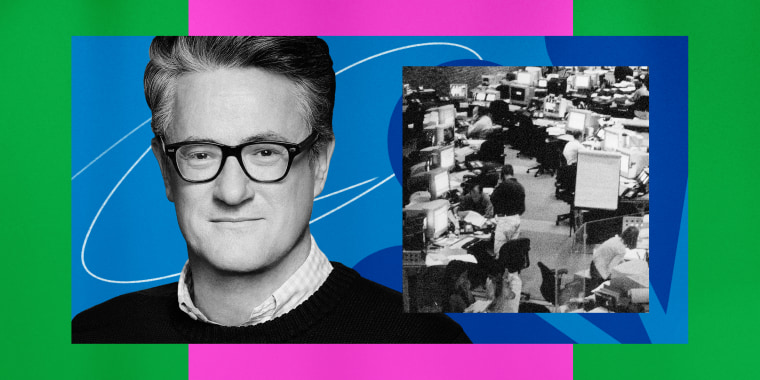Help us celebrate MSNBC’s first 25 years by joining us every day for 25 days as our anchors, hosts, and correspondents share their thoughts on where we've been — and where we’re going.
Much has changed in the political and media world since MSNBC first went on the air 25 years ago. The network was launched as a joint venture between Microsoft and NBC, with the goal of bringing the power of NBC News to cable and uniting that force with the tech world’s emerging giant. A few years later, Time Warner followed suit by teaming up with AOL in a merger that leaders in both companies believed would forever transform America’s media landscape.
It was a disaster.
New Media’s dream of an online revolution would be mothballed for another decade.
Within a few years, AOL stock was in free fall and this corporate marriage made in heaven blew into a million pieces; New Media’s dream of an online revolution would be mothballed for another decade. The fallout was memorialized in books like Nina Munk’s excellent “Fools Rush In: Steve Case, Jerry Levin, and the Unmaking of AOL Time Warner” and Michael Wolff’s brilliant take on the “New-Media-Is-Eating-TV” narrative, “Television is the New Television.”
A decade later, media analysts are predicting that streaming video will lay waste to the television landscape and that 330 million Americans will be neatly folded into four or five streaming services. If a Wall Street trader was placing bets on the future of the media ecosystem based on my family’s viewing habits, that might seem like a safe bet. Still, I would take a quick look at Munk and Wolff’s cautionary tales on New Media’s last revolution before betting the house on the next generation’s AOL.
Not so long ago, essays and news features were filling magazines and newspapers predicting the print industry’s coming collapse. But this death was greatly exaggerated. The New York Times, Wall Street Journal, and the Washington Post have thrived — whether measured by awards or profits. The publishers of these news icons doubled down on their investments in reporting. This strategy, employed by Laurene Powell Jobs, has turned The Atlantic into a mecca for the brilliant reporting and indispensable writing of journalists like Jeffrey Goldberg, Anne Applebaum, George Packer, Caitlin Flanagan and Frank Foer.
Even in the most dizzying of times for media companies, investing in talented reporters can pay off for investors while strengthening American democracy.
Like any vibrant news outlet, MSNBC has spent the last quarter century in constant movement, transforming itself from a shadow of NBC News to an eclectic mix of journalists and political analysts representing all wings of the ideological spectrum. Philly’s Chris Matthews held court on his era-defining show “Hardball”; Keith Olbermann gave voice to progressives’ angst at the height of the Iraq War; Tucker Carlson used his time slot to engage in heated, intelligent debates with Rachel Maddow while launching her TV career; and dozens of other hosts cycled in and out as network president Phil Griffin searched for the perfect balance. I often accused Phil of being a “day trader,” but if he was, Griffin was a brilliant short-term operator. His bets proved he knew better than all of his peers how to play the long game.
I remember Phil pacing in his small Secaucus office in May 2003, sweating over the network’s dismal ratings. There was talk of MSNBC being shut down and becoming a movie channel. He was so desperate that he even hired me, despite the fact I had no experience in news or as a host. Panicking in his office, Phil suggested he could be fired the next week.
Seventeen years later, Phil Griffin retired as MSNBC’s president with the network in first place. Over the course of his tenure, MSNBC’s hosts became more progressive, more diverse, and more aggressive in advocating for change across America and the world. And while network viewers have followed those trend lines, they are also patient enough to listen for three hours a day to a small government conservative who believes in American exceptionalism, limited government and a strong military.
For those who would attack the network for being reflexively liberal, I would gently remind them that the longest-running host on MSNBC is a former Republican congressman from the South.
For those who would attack the network for being reflexively liberal, I would gently remind them that the longest-running host on MSNBC is a former Republican congressman from the South who always voted for his party’s nominee for president until 2016. And I am grateful that MSNBC’s new president, Rashida Jones, has given Mika, Willie, and me all the support and independence needed to continue improving “Morning Joe.” Her friendship is important to us and her leadership will surely be felt across the entire network.
And while I have been bitterly disappointed in the path my former party has taken, I have been encouraged by the new friendships and alliances I have made with Americans who care more about liberal democracy’s future than the political issues that may separate us from time to time.
I came to MSNBC optimistic, and remain so today. The future may seem uncertain, and even frightening at times. Yet I know that this new reality requires each of us to do our part to speak truth to power, report the news fairly, and listen to Americans from all walks of life as we collectively bring our country together. That project may take another 25 years or so, but it will be well worth the effort.
